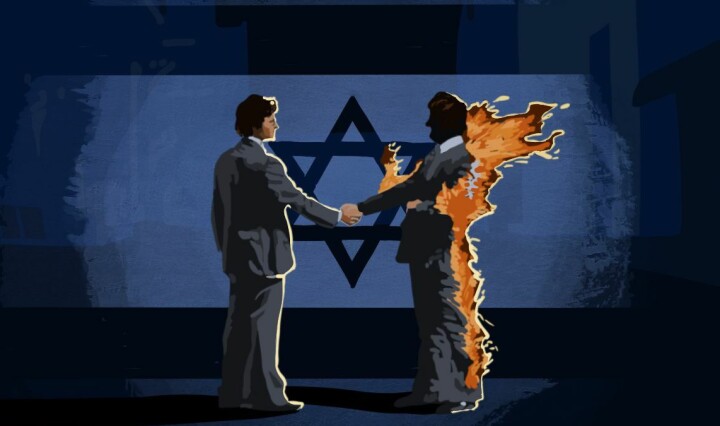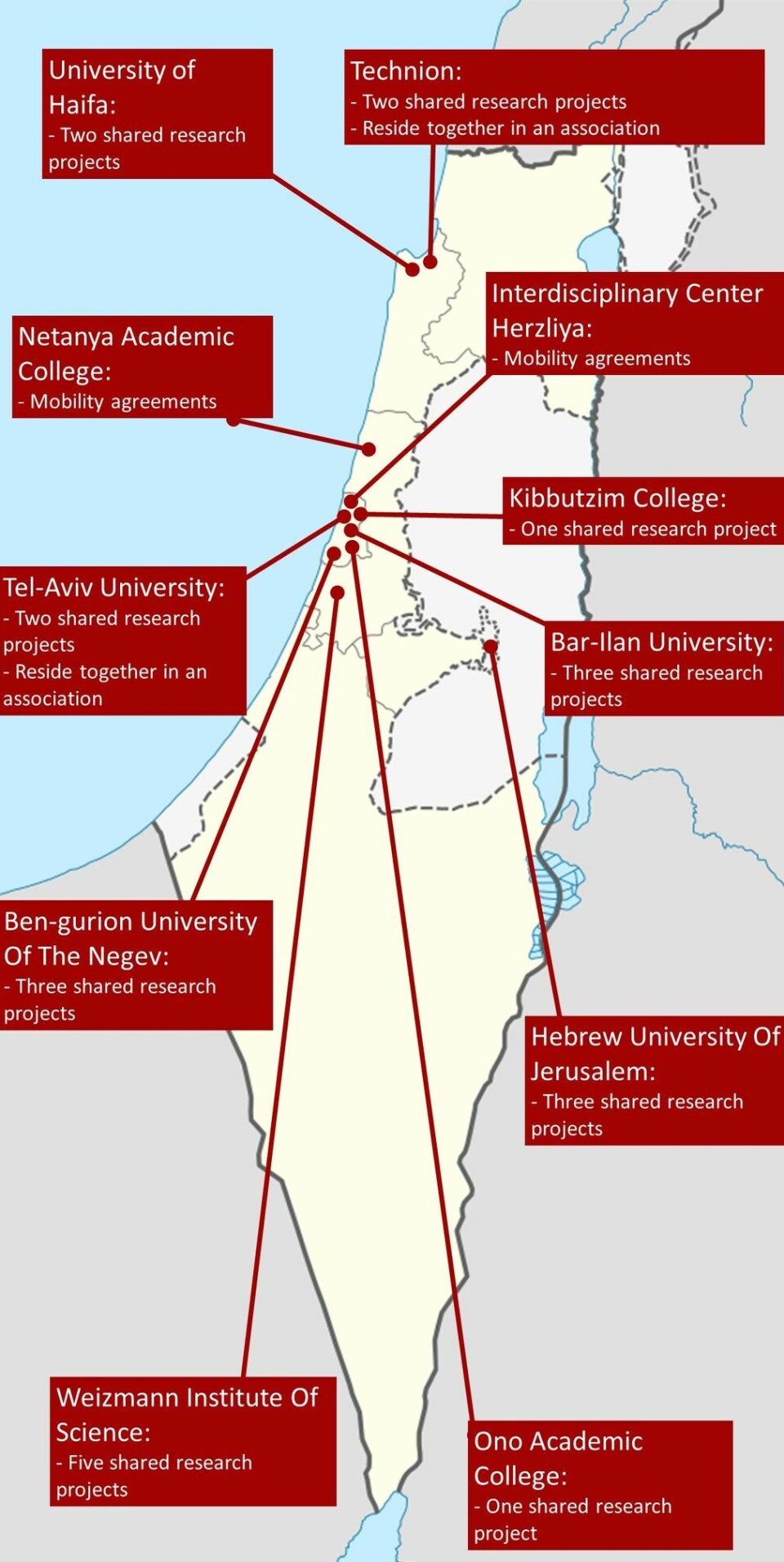ANALYSIS ISRAEL
KU Leuven's collaboration with Israeli partners on the arms industry faces criticism

KU Leuven works with Israeli universities in a variety of ways. Said partners are closely linked to the Israeli army and arms industry. The demand for a boycott is increasing from different areas.
Due to the events in Gaza, the demand for severing ties with Israël are becoming increasingly louder in the academic world. For example, more than 700 students and employees from the five Flemish universities called for a boycott of Israeli universities, companies and government institutions.
The debate has been going on at KU Leuven for some time as well. At the end of September an open letter appeared in the newspaper De Standaard, signed by several academics from the university, asking to stop the cooperation between Israel and KU Leuven. 'By entering academic partnerships with Israel, KU Leuven may unintentionally grant legitimacy to an apartheid regime', it said firmly.
The academics base this on reports from Amnesty International and Human Rights Watch, among others. They state that Israeli authorities are guilty of 'apartheid', crimes against humanity' and that Israel leads a system of oppression and domination leading to apartheid against Palestinians.
Collaborations
KU Leuven collaborates with Israeli institutions in various ways. Therefore, Israel is part of the European Research Area as an 'associated country'. This way Israeli universities can participate in some research projects that are subsidized by the European Union, together with European research institutions like KU Leuven.
There are currently about thirty of these projects for which the KU Leuven collaborates with Israeli institutions — universities and others — within the framework of Horizon 2020 and Horizon Europe, the research programmes of the European Union. In the past, the university collaborated with Isreali partners in almost 200 of these projects.
'Exceptionally close ties are maintained with the Israeli aviation industry, the Ministry of Defense and various army and air units'
Industry guide to Technion
KU Leuven also works with Israel outside of their shared European research projects. About four projects are financed with money from the Research Foundation – Flanders (FWO), and there are agreements regarding student mobility with Hebrew University, Netanya Academic College and Interdisciplinary Center of Herzliya.
In addition, KU Leuven participates in a partnership between universities with two institutions. KU Leuven itself chairs one of these: CESAER. This is an international association of technical universities. KU Leuven resides there, together with the Israeli university Technion.
Close ties with the military
- According to the signatories of the open letter in De Standaard, such collaborations are not innocent: 'The universities are all guilty. They all have strong ties with the military and thus contribute to the human rights violations by Israel and the Israeli army', says initiator Lieven De Cauter, professor at KU Leuven.

The universities Veto investigated do not hide their strong associations with the army and military-industrial complex in Israel. For example, Technion has an 'Industry Guide to Technion' on its website in which it describes, among other things, the development of autonomous systems such as drones 'with many possible applications in defense, medicine and industry'.
Additionally, the guide describes how the university 'maintains exceptionally close ties with Israel's aerospace industry, including companies such as Israel Aerospace Industries, Rafael Advanced Defense Systems and Elbit Systems, the research agencies of the Ministry of Defense, and various technological ground and air force units'.
The three companies mentioned are all weapons manufacturers, the latter — Elbit — states on its own website that they are the 'backbone of the drone capacity of the Israel Defense Forces (the Israeli army, red.)'. Elbit is also referred to as 'Guardian of Technion' and is therefore an important donor.
Widely supported
Other universities also have strong ties with the army. For example, the University of Bar-Ilan has a 'Center for Strategic Studies' that provides advice to, among others, the Israeli army. Bar-Ilan is also controversial because of its ties to Ariel University. That university was for a long time a Bar-Ilan campus and is located in an illegal settlement in the West Bank.
Meanwhile, the KU Leuven's ethics committee no longer gives permission for research projects with the institution. The university has not yet been able to provide us with any additional details about this. KU Leuven is currently working with Bar-Ilan on three projects, the two most recent ones started in June 2022.
'The association agreement with Israel states that international humanitarian law must be respected'
Peter Van Elsuwege, professor European Law (UGent)
Ben-Gurion University entered into a research collaboration on quantum technology with the Israeli Ministry of Defense. Tel Aviv University had several research projects as well that were sponsored by the Ministry of Defense in the past.
Hebrew University offers academic programs for the Israeli military. It also supports them in the current conflict in Gaza, as can be read on its website. Hebrew University, like Bar-Ilan, is linked to the illegal occupation by Israel: the university is located in East Jerusalem. In addition, Elbit boss Michael Federmann is an honorary member of the board of directors.
Aside from Hebrew University, several universities are now voicing their support for the Israeli government in the struggle in Gaza. Technion and Tel Aviv University, among others, hand out scholarships to reservists. Veto found no projects in which KU Leuven directly participated in research for military purposes, but critics believe that the university does support and legitimize them through its collaboration with Israeli institutions.
Human rights policy
According to Professor of European Law, Peter Van Elsuwege (UGent), such ties can be a reason to suspend collaborations: 'It is reasonable to me if you see that those institutions work closely with or at the service of the army, and work on research that is used for human rights violations.'
'Israeli scientists are top researchers, but only focusing on research is turning your back on the brutal reality'
Bert Cornillie, professor KU Leuven
However, this is the responsibility of the universities themselves, says Van Elsuwege. As long as there is no legal framework in the form of, for example, sanctions that are announced, there is no hard legal obligation. The universities are free to pursue their own human rights policy.
Arguments to suspend cooperation with Israel also exist at European level, Van Elsuwege mentions. 'The association agreement with Israel states that international law and human rights must be respected, but in practice this is often not applied. There must be consensus between the Member States. Given how difficult it is to find this regarding the call for humanitarian breaks, such consensus may not happen around the suspension of the association agreement.'
Quality partners
Aside from a difficult to achieve consensus, other reasons may also play a role. After all, Europe has little to gain from terminating the association agreements, critics say. Concerning research, Israeli academics produce very high-quality work. That is also reflected in international rankings. Israel has three universities in the top 100 of the latest Shanghai Ranking.
However, that should not be taken into consideration according to the signatories. 'Israeli scientists are top researchers, but only focusing on research is turning your back on the brutal reality', expresses professor and alderman of Leuven Bert Cornillie (KU Leuven).
University response
KU Leuven did not wish to give an interview, but responded via its press agency: 'As a university, we condemn any form of violence against civilians and support the international call for all parties to seek a peaceful solution and to uphold the laws of war and international humanitarian law, so that there are no more victims', it sounds.
'Our thoughts are with everyone affected by this horrific war, including our colleagues and students who are in great uncertainty about their families and friends in their home countries. We try to accommodate and support them as best as possible.'
'We will not automatically equate an academic institution with the government of its home country. Just because a government is guilty of serious human rights violations does not mean that all academic institutions in that country are doing the same. Sometimes academic collaboration is even a final line between democratic forces.'
Whether cooperation is opportune (and whether it contributes to malpractices), is therefore assessed at the level of the partner institution and based on the content of the collaboration'. However, the distinction between academic institution and government does not always seem to be so clear-cut in the case of Israeli universities.









